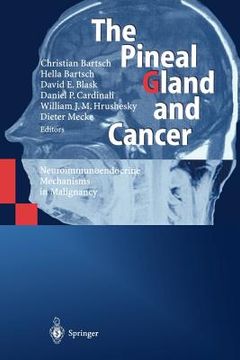Compartir
the pineal gland and cancer: neuroimmunoendocrine mechanisms in malignancy (en Inglés)
C. Bartsch
(Ilustrado por)
·
H. Bartsch
(Ilustrado por)
·
D. E. Blask
(Ilustrado por)
·
Springer
· Tapa Blanda
the pineal gland and cancer: neuroimmunoendocrine mechanisms in malignancy (en Inglés) - Bartsch, C. ; Bartsch, H. ; Blask, D. E.
$ 104.20
$ 109.99
Ahorras: $ 5.79
Elige la lista en la que quieres agregar tu producto o crea una nueva lista
✓ Producto agregado correctamente a la lista de deseos.
Ir a Mis Listas
Se enviará desde nuestra bodega entre el
Viernes 17 de Mayo y el
Lunes 20 de Mayo.
Lo recibirás en cualquier lugar de Estados Unidos entre 1 y 3 días hábiles luego del envío.
Reseña del libro "the pineal gland and cancer: neuroimmunoendocrine mechanisms in malignancy (en Inglés)"
Three years ago, most authors contributing to this book gathered at the Heinrich Fabri Institute of the University of Tübingen at Blaubeuren near Ulm in Germany for the third conference on "Pineal Gland and Cancer". In 1987, the late Derek Gupta organized the second meeting and published the first book on the topic, 10 years after Vera Lapin, as part of the 25th anniversary celebrations of the Vienna Cancer Research Institute, had held the first meeting. It was in Vienna during the 1930s and 1940s that W. Bergmann and P. Engel demonstrated that pineal extracts possess growth inhibitory properties on experimental rodent tumors and R. Hofstätter reported favorable results when these extracts were given to cancer patients. In the 1970s, Vera Lapin and others reported that surgical removal of the pineal gland (pinealectomy) stimulates experimental tumor growth rendering fundamental support for an involvement of the pineal gland in malignancy. A focal question of past and present research in this field is whether the pineal gland exerts its tumor inhibitory activity primarily or exclusively via melatonin. Currently, it appears that the action of melatonin on experimental tumor growth criti- cally depends on the circadian timing of its administration as weH as on the type and stage of cancer, and that primarily highly differentiated tumor ceHs are controHed. Initial clinical applications of the pineal hormone for incurable cancers raise hopes for a promising future use, particularly when combined with other therapies (e. g.
- 0% (0)
- 0% (0)
- 0% (0)
- 0% (0)
- 0% (0)
Todos los libros de nuestro catálogo son Originales.
El libro está escrito en Inglés.
La encuadernación de esta edición es Tapa Blanda.
✓ Producto agregado correctamente al carro, Ir a Pagar.

